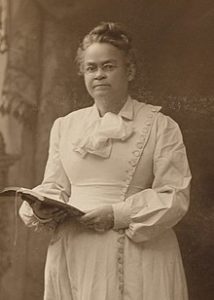By Rhonda Cooksey
Carry A. Nation wa s born Carrie Amelia Moore to a slave holding family in Garrard County Kentucky on November 25, 1846. In anticipation of the Civil War, her father moved the family to High Grove Farm outside of Belton, Missouri when Carrie was eight-year-old. At age 21, she married Charles Gloyd, a former Union soldier who had been a border in her parents’ home. According to the Missouri Historical Society, she dearly loved him and quickly became pregnant, but he died when their daughter was only six-months-old from hard drinking. Carrie first returned to her parents’ home, then built a home in Holden, Missouri and lived there with her young daughter and mother-in-law. The difficult experience convinced her that drinking caused catastrophic problems for families and society. Hence the stern, disgruntled look in the photo.
s born Carrie Amelia Moore to a slave holding family in Garrard County Kentucky on November 25, 1846. In anticipation of the Civil War, her father moved the family to High Grove Farm outside of Belton, Missouri when Carrie was eight-year-old. At age 21, she married Charles Gloyd, a former Union soldier who had been a border in her parents’ home. According to the Missouri Historical Society, she dearly loved him and quickly became pregnant, but he died when their daughter was only six-months-old from hard drinking. Carrie first returned to her parents’ home, then built a home in Holden, Missouri and lived there with her young daughter and mother-in-law. The difficult experience convinced her that drinking caused catastrophic problems for families and society. Hence the stern, disgruntled look in the photo.
In 1874, she mar
ried David Nation, a Warrensburg teacher and lawyer, who became a preacher and moved them to Medicine Lodge, Kansas. That’s where Mother Nation, as she came to be known, organized a local chapter of the Women’s Christian Temperance Union (WCTU), a society founded by women to keep their husbands sober by legalizing prohibition. At the end of the nineteenth century, women lacked the right to take their children and leave abusive, alcoholic husbands. Even if they did, they had few ways to earn a living, and their children were legally the wards of the husband. Even as a supporter of temperance, suffrage, and women’s rights, Carry (she actually changed her name) remained charitable and sympathetic to the plight of alcoholics, and her group often visited men in prison for prayer and song.
In 1900, they began smashing bars, and her notorious attack on the Carey Hotel in Wichita made the hatchet-slinging, saloon-destroying Carry Nation and her singing, praying sisters-of-destruction famous. Her husband divorced her for desertion, but she was able support herself and pay her numerous fines by working as a crusader, giving lectures, selling souvenir hatchets, and writing about women’s rights and the immorality of liquor. For a time, she published a newsletter called The Hatchet and a magazine called the Smasher’s Mail. Often beaten during her raids and jailed more than 30 times for what she called “hatchetations,” she considered herself divinely chosen to work for women’s causes, suffrage, and especially prohibition.
She eventually retired to Eureka Springs, Arkansas and ran a home for women who had lost everything because of their husbands’ drunkenness. Still promoting women’s rights at age 64, she collapsed while giving a lecture in 1922 and died. Carry A Nation is buried beside her mother in Belton, Missouri.